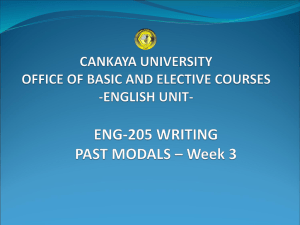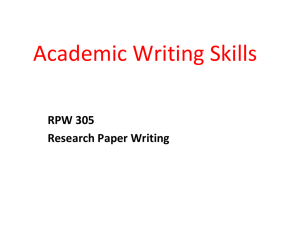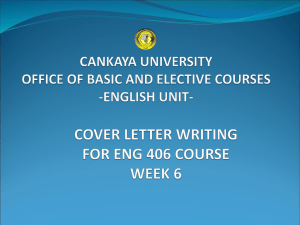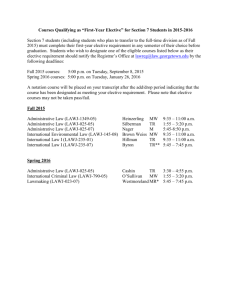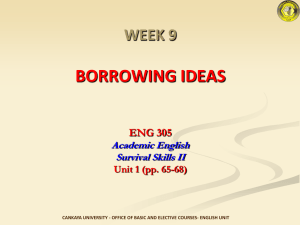Ex - ACS106
advertisement
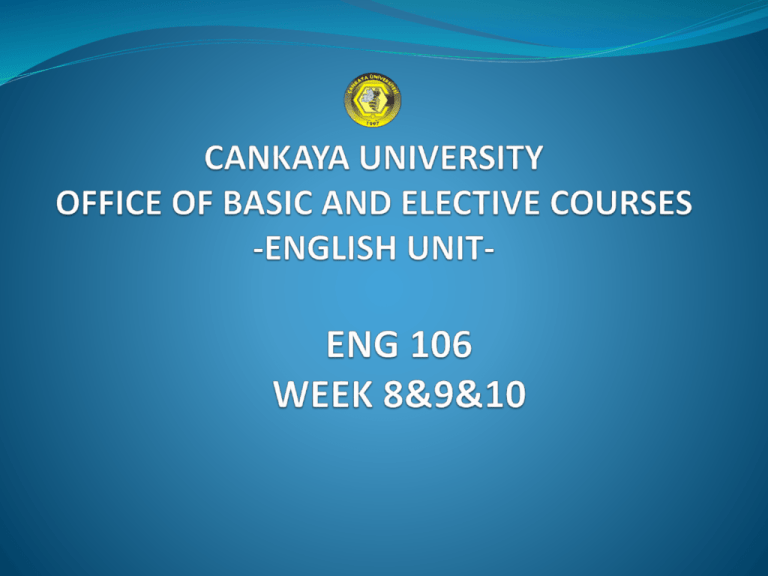
THE EFFECTS of PROSPERITY CANKAYA UNIVERSITY - OFFICE OF BASIC AND ELECTIVE COURSES- ENGLISH UNIT CANKAYA UNIVERSITY - OFFICE OF BASIC AND ELECTIVE COURSES- ENGLISH UNIT Prosperity(n): the state of having money and everything that is needed for a good life Word Formation : Prosperous (adj) Synonyms : wealth Collocations : prosperity of Ex: The future prosperity of the country depends on its imports and exports Ex: They are a prosperous family with a very high income. CANKAYA UNIVERSITY - OFFICE OF BASIC AND ELECTIVE COURSES- ENGLISH UNIT Life Expectancy(n): The number of years people live on average Ex: The British male now has a life expectancy of 77.6 years Ex: The life expectancy in this country is very short. CANKAYA UNIVERSITY - OFFICE OF BASIC AND ELECTIVE COURSES- ENGLISH UNIT Literacy(n): the state of being able to read and write Word Formation : Literate (adj), Illiterate (adj Collocations : Literacy rate Ex: There is a literacy campaign organized for women. Ex: The literacy rate of the country has increased significantly. CANKAYA UNIVERSITY - OFFICE OF BASIC AND ELECTIVE COURSES- ENGLISH UNIT Mental(adj): related to the state of mind Collocations : Mental health Ex: Stress has an effect on people’s mental health. Ex: Her mental problems prevent her from having friends. CANKAYA UNIVERSITY - OFFICE OF BASIC AND ELECTIVE COURSES- ENGLISH UNIT Per capita(adj): for each person Ex: The per capita income of the country is $2000 for a month. CANKAYA UNIVERSITY - OFFICE OF BASIC AND ELECTIVE COURSES- ENGLISH UNIT Wealth (n): the amount of money that a country or a person has Word Formation : Wealthy (adj) Ex: The country’s wealth comes from oil. Ex: He was poor when he was young, but he became very wealthy later. CANKAYA UNIVERSITY - OFFICE OF BASIC AND ELECTIVE COURSES- ENGLISH UNIT Previewing the Academic Content In many countries life seems to be easier now than at any time in history. We have wonderful technology that helps us to do things that our grandparents could only dream about. Most countries have more wealth than ever before. Is this all good ? Many people argue that there are problems. Statistics show that many countries have worse social problems as they get richer Is it really the best of the times ? What do you think ? CANKAYA UNIVERSITY - OFFICE OF BASIC AND ELECTIVE COURSES- ENGLISH UNIT 1. Look at the statistics in the chart on page 92. Answer the questions. Country A Country B Population 5,460,000 657,000 GDP per capita $ 56,427 $ 1,668 Life Expectancy 78 55 Literacy Rate 99% 47% 1. Which country would you like to live in ? Why ? CANKAYA UNIVERSITY - OFFICE OF BASIC AND ELECTIVE COURSES- ENGLISH UNIT 2. What do you think life is like in these two countries ? 1. 2. 3. 4. 5. Going shopping Technology Happiness Chances to go college Other ………. CANKAYA UNIVERSITY - OFFICE OF BASIC AND ELECTIVE COURSES- ENGLISH UNIT 3. Which factors do you think are important for happiness ? Choose the most three important to you. Wealth Good physical health Good mental health Family and/or friends A good job Appliance that make life easier such as dishwashers and cars Opportunities to buy almost anything you want 4. Do you think your life is better than the life of your granparents? CANKAYA UNIVERSITY - OFFICE OF BASIC AND ELECTIVE COURSES- ENGLISH UNIT Previewing the Academic Skills Focus 1. Look at the pictures and questions on page 93. Which question has an answer that can not be questioned easily ? Which question has an answer about which people might disagree? 1. has an answer that can’t be questioned easily 2. has an answer about which people might disagree CANKAYA UNIVERSITY - OFFICE OF BASIC AND ELECTIVE COURSES- ENGLISH UNIT Fact and Opinion Statements can be facts or opinions. Facts have evidence that is difficult to question. It can be tested or proven. People generally agree about facts Opinions are a person’s thoughts, beliefs, or feelings about something. Opinions often introduced by phrases such as: I think , I believe, In my opinion, It seems to me etc. Opinions can be questioned easily. To help you decide between fact or opinion ask yourself: Can I check whether it is true? Would other people have a different opinion about it ? CANKAYA UNIVERSITY - OFFICE OF BASIC AND ELECTIVE COURSES- ENGLISH UNIT 2. Use the two questions in the skill box on page 94 to decide if the statements are facts and opinions. 1. Fact 2. Opinion 3. Fact 4. Opinion 5. Fact CANKAYA UNIVERSITY - OFFICE OF BASIC AND ELECTIVE COURSES- ENGLISH UNIT KEY WORDS CANKAYA UNIVERSITY - OFFICE OF BASIC AND ELECTIVE COURSES- ENGLISH UNIT Decrease (v): to become smaller Synonyms : fall, decline, go/come down Antonym : increase Ex: During the summer, rainfall decreases. Ex: The number of people who smoke has decreased. CANKAYA UNIVERSITY - OFFICE OF BASIC AND ELECTIVE COURSES- ENGLISH UNIT Afford(v): to have enough money to buy or to pay for something Word Formation : Affordable (adj) Ex: We can afford to go to Miami this year. Ex: It is not an affordable car for us. It is too expensive. CANKAYA UNIVERSITY - OFFICE OF BASIC AND ELECTIVE COURSES- ENGLISH UNIT Double(v): to become twice as much or big Word Formation : Doubled (adj) Ex: The prices of the houses has doubled for the last two years. Ex: Accidents will be doubled because of the new road. CANKAYA UNIVERSITY - OFFICE OF BASIC AND ELECTIVE COURSES- ENGLISH UNIT Twice(adv): two times Collocations : twice as much / many Ex: They have employed 50 people, twice as many last year. Ex: The shop earned $ 1000 yesterday, twice as much the day before. CANKAYA UNIVERSITY - OFFICE OF BASIC AND ELECTIVE COURSES- ENGLISH UNIT Triple(v): to become three times as much or big Word Formation : Tripled (adj.) Ex: At the end of the year, the number of the students will be tripled. Ex: They plan to triple their profit next year. CANKAYA UNIVERSITY - OFFICE OF BASIC AND ELECTIVE COURSES- ENGLISH UNIT Halve(v): to reduce something by a half Ex: They have halved the prices of flights to New York. Ex: The number of the employees halved last year as a result of economic crisis. CANKAYA UNIVERSITY - OFFICE OF BASIC AND ELECTIVE COURSES- ENGLISH UNIT Figure(n): a number representing an amount Ex: The city’s figure of unemployment for the last year is very surprising. Ex: Government figure show an increase in tax rates. CANKAYA UNIVERSITY - OFFICE OF BASIC AND ELECTIVE COURSES- ENGLISH UNIT Give up(phr.v.): to stop doing something Ex: The students of Çankaya University is giving up smoking with the help of campaign of the Rector. Ex: She gave up studying for university exams and started to work with her father. CANKAYA UNIVERSITY - OFFICE OF BASIC AND ELECTIVE COURSES- ENGLISH UNIT Fortunate(adj): happening because of good luck Word Formation : Fortunately (adv.) Collocations : Fortunate to do something Ex: I was fortunate to find somebody that I know in this country. Ex: She felt fortunate because she could walk easily. CANKAYA UNIVERSITY - OFFICE OF BASIC AND ELECTIVE COURSES- ENGLISH UNIT Disease(n): an illness which affect a person, an animal or a plant. Ex: She suffers from a rare disease of brain. Ex: He caught the disease while travelling in Africa. CANKAYA UNIVERSITY - OFFICE OF BASIC AND ELECTIVE COURSES- ENGLISH UNIT Income(n): the money that you earn Collocations : disposible income provide income Ex: Jack has an income of $3000 a month. Ex: This new strategy provides them extra income. Ex: Because her husband pay all debts and bills, she uses her salary as disposable income. CANKAYA UNIVERSITY - OFFICE OF BASIC AND ELECTIVE COURSES- ENGLISH UNIT Before You Listen 1. Read the paragraph (page 94) and answer the questions. 1. What do people in your grandparents’ generation say about old days ? 2. Which of the points in the paragraph would they agree with? 3. Was there a golden age in your country ? When was it ? CANKAYA UNIVERSITY - OFFICE OF BASIC AND ELECTIVE COURSES- ENGLISH UNIT 2. Make some guesses about the statements on page 95. Use the key words to complete the sentences. 1. double 2. triple 3. halved 4. fortunate; twice; disposable income CANKAYA UNIVERSITY - OFFICE OF BASIC AND ELECTIVE COURSES- ENGLISH UNIT Global Listening 1. Read the questions in the chart and listen to the lecture. Answer the questions while listening. (Page 95) 1. Life is more convenient now than in the past. 2. People can buy more now than in the past. 3. People are safer now than in the past. 4. Modern people would find it difficult to live as people did in 1900. 5. A “golden age” did not exist in the past. 6. Now is the best time in the last 100 years. 2. Discuss the questions on page 96. 1. Not all the time. He says so right at the end. 2. Probably, the times he feels less fortunately. CANKAYA UNIVERSITY - OFFICE OF BASIC AND ELECTIVE COURSES- ENGLISH UNIT Focused Listening 1. Listen to the lecture again and write notes about the details. 1. Main Idea: Life is more convenient Supporting Details: These technologies make life more convenient: • air-conditioning • computer / e-mail / Internet / databases • international weather forecasts • affordable, frequent jet airliners • cell phones CANKAYA UNIVERSITY - OFFICE OF BASIC AND ELECTIVE COURSES- ENGLISH UNIT 2. Main Idea: People can buy more now than in the past. Supporting Ideas: average disposable income buys more than twice as much • we have more than twice as many cars per person • we eat out two and a half times as often • it now takes seven minutes to earn enough to buy half gallon of milk, compared with 40 minutes 80 years ago CANKAYA UNIVERSITY - OFFICE OF BASIC AND ELECTIVE COURSES- ENGLISH UNIT 3. Main Idea: People are safer now than in the past. Supporting Details: Number of deaths from car accidents halved. 4. Main Idea: Modern people would find it difficult to live as people did in 1900. Supporting Details: The (Bowler) family had trouble trying to do this. CANKAYA UNIVERSITY - OFFICE OF BASIC AND ELECTIVE COURSES- ENGLISH UNIT 5. Main Idea: 5. A “Golden Age” did not exist in the past. Supporting Details: • The (Bowler) family had problems: this suggests life was harder than we think. • John Mueller: the past gets better in our memories • John Templeton and the lecturer both see the present as better than the past 6. Main Idea: Now is the best time in the last 100 years. Supporting Details: both the author and John Templeton both see the present as being better than the past. CANKAYA UNIVERSITY - OFFICE OF BASIC AND ELECTIVE COURSES- ENGLISH UNIT Identifying and Evaluating Information Presented to Support a Position Ideas and arguments presented to support an opinion can be strong or weak. In academic situations, it is important to see the difference betwweb strong and weak support. Looking for strong supports is an important part of critical thinking. CANKAYA UNIVERSITY - OFFICE OF BASIC AND ELECTIVE COURSES- ENGLISH UNIT Usually strong ideas and arguments: are based on facts are based on clear logic Weak ideas and arguments are often: based on opinions based on statements that look like facts that have no supporting evidence or reference based on only one example, which might not be usual or normal. CANKAYA UNIVERSITY - OFFICE OF BASIC AND ELECTIVE COURSES- ENGLISH UNIT 3. Discuss the strength of the main ideas you heard in the lecture and complete the chart on page 97. Overall do you think the lecturer’s opinions are well supported? CANKAYA UNIVERSITY - OFFICE OF BASIC AND ELECTIVE COURSES- ENGLISH UNIT Main Ideas How Strong is the Evidence ? 1. Life is more convenient now than in the past Strong 2. People can buy more now than in the past Strong 3. People are safer now than in the past. Weak Reason 4. Modern people would find it Middle (possibly strong) difficult to live as people did in 1900. 5. A “Golden Age” did not exist in the past. Weak (possibly middle) 6. Now is the best time in the last 100 years. Middle (possibly weak) CANKAYA UNIVERSITY - OFFICE OF BASIC AND ELECTIVE COURSES- ENGLISH UNIT Main Ideas How Strong is Reason the Evidence ? 1. Life is more convenient now than in the past Strong Based on fact 2. People can buy more now than in the past Strong Based on fact 3. People are safer now than in the past. Weak The only safety issue mentioned is car accidents. Other types of accidents, and crime, could mean that we are less safe. 4. Modern people would find it difficult to live as people did in 1900. Middle (possibly strong) It could be argued that the example of only one family is not strong evidence, and that, since the family didn’t have a community around them to support them, the experiment wasn’t realistic anyway. 5. A “Golden Age” did not exist in the past. Weak (possibly All the arguments for this seem to be middle) based on opinion. 6. Now is the best time in the last 100 years. Middle (possibly weak) The fact that we have modern conveniences, can buy more with our income etc can't easily be denied; however, there may be other reasons (such as better relationships) why the was “better.” CANKAYA UNIVERSITY - OFFICE OF BASICpast AND ELECTIVE COURSES- ENGLISH UNIT Recognizing a Speaker’s Degree of Certainty Speakers use various words and expressions to show how certain they are about their ideas and points. If someone says,” People are certainly wealthier now than their grandparents were” s/he expresses that they are sure about this point. Just because someone show s/he is certain about something with these words, it does not mean s/he is talking about a fact. CANKAYA UNIVERSITY - OFFICE OF BASIC AND ELECTIVE COURSES- ENGLISH UNIT 4. Work with a partner and place the words from the box on the scale on page 99. 1. Not at all certain: 2. Somewhat Certain: maybe perhaps might not sure Could probably Like 3. Certain: is Definitely doubtless CANKAYA UNIVERSITY - OFFICE OF BASIC AND ELECTIVE COURSES- ENGLISH UNIT 5. Listen to some statements from the lecture. Write the number of the statement on the scale. Not at all certain: 4, 6 Somewhat certain: 3 Certain: 1, 2, 5 CANKAYA UNIVERSITY - OFFICE OF BASIC AND ELECTIVE COURSES- ENGLISH UNIT CANKAYA UNIVERSITY - OFFICE OF BASIC AND ELECTIVE COURSES- ENGLISH UNIT Commit suicide(v): to kill oneself Ex: Unhappy teenagers try to commit suicides more often than other people CANKAYA UNIVERSITY - OFFICE OF BASIC AND ELECTIVE COURSES- ENGLISH UNIT Crime(n): breaking the law Word Formation : Criminal (adj.) Collocations : Commit a crime Ex: Women commit fewer crime than men. Ex: The causes of criminal behavior is being discussed among the experts. Ex: Britney Spears is in love with a criminal. CANKAYA UNIVERSITY - OFFICE OF BASIC AND ELECTIVE COURSES- ENGLISH UNIT Increase(v): to add more to size or number Word Formation : Increase (n) Antonym : decrease (v&n) Ex: The population increased dramatically in the first half of the century . Ex: There is an increase in the number of people who attempt to commit a crime. CANKAYA UNIVERSITY - OFFICE OF BASIC AND ELECTIVE COURSES- ENGLISH UNIT Violent(adj.): trying to injure or kill Word Formation : Violence (n) Ex: Many people were injured during the violent events throughout the day. Ex: Governments should prevent the violence against women. CANKAYA UNIVERSITY - OFFICE OF BASIC AND ELECTIVE COURSES- ENGLISH UNIT Go into(phr. v): to change to a different movement, state, or condition, usually a worse one Ex: Sales went into a decrease last year. Ex: The countries went into a recession as a result of the social and economical crises. CANKAYA UNIVERSITY - OFFICE OF BASIC AND ELECTIVE COURSES- ENGLISH UNIT Put together(phr.v.): to form people or things into a group Ex: We have put together the sales and marketing teams. Ex: They put together the data and created an index. CANKAYA UNIVERSITY - OFFICE OF BASIC AND ELECTIVE COURSES- ENGLISH UNIT Steadily(adv.): continuing or developing gradually Word Formation : Steady (adj) Collocations : grow steadily decrease steadily Ex: The company’s exports have grown steadily. Ex: Our debts are decreasing steadily. CANKAYA UNIVERSITY - OFFICE OF BASIC AND ELECTIVE COURSES- ENGLISH UNIT Civilized(adj.):a civilized country, society etc has developed an advanced culture and institutions Word Formation : Civilization (n) Ex: In civilized societies, people respect to each other’s rights. Ex: They are researching the ancient civilizations of Mesopotamia and Egypt. CANKAYA UNIVERSITY - OFFICE OF BASIC AND ELECTIVE COURSES- ENGLISH UNIT Current(adj.): happening or existing now Word Formation : currently (adv.) Ex: The current president of United States is Obama. Ex: The results of the current political situation will be seen at least 5 years later. CANKAYA UNIVERSITY - OFFICE OF BASIC AND ELECTIVE COURSES- ENGLISH UNIT Internal(adj. ): within a country Antonym : External (adj.) Collocations : internal affairs internal security Ex: No other country can interfer with our internal affairs Ex: Internal security of the country is provided by the police. Ex: We will get information from external sources CANKAYA UNIVERSITY - OFFICE OF BASIC AND ELECTIVE COURSES- ENGLISH UNIT Well-being(n.): a feeling of being comfortable, happy and healthy Collocations : well-being of Ex: As doctors, we are responsible for the well-being of our patients. Ex: Well-being of people in a country should be the first aim of governments. CANKAYA UNIVERSITY - OFFICE OF BASIC AND ELECTIVE COURSES- ENGLISH UNIT Renew(v.): to replace something that old or damaged Ex: We need to renew the windows as they are really old . Ex: Renewing a society is a very hard thing to do in a short time. CANKAYA UNIVERSITY - OFFICE OF BASIC AND ELECTIVE COURSES- ENGLISH UNIT Before You Read 1. Look at the bar graph which shows some social trends from the text you will read. Guess where the words from the box go on the graph. Write them on the lines. (page 99 ) 1. Depression 2. Violent Crime 3. Teenage Suicide 4. Divorce 2. What feeling do you get from the statistics in the graph on page 99? How does that feeling compare with the lecturer’s feeling? 3. Think about Turkey. Are these problems increasing or decreasing, or staying the same ? Use the words for degrees of certainty. CANKAYA UNIVERSITY - OFFICE OF BASIC AND ELECTIVE COURSES- ENGLISH UNIT Global Reading • Skim the reading and write the paragraph number next to each main idea. Discuss what clues helped you to find the main idea. ___ 2 Index of National Civic Health 4 Children and young people ___ 5 The forces behind the social changes ___ 3 Behind the numbers are real people ___ 1 Social problems ___ CANKAYA UNIVERSITY - OFFICE OF BASIC AND ELECTIVE COURSES- ENGLISH UNIT Focused Reading 1. Scan the text to find five social trends. Complete the left- hand column. Social Trends How big was the change ? Divorce Suicide Violent Crime Depression Number of people in prison 2. Now read the text in detail and complete the right-hand column. CANKAYA UNIVERSITY - OFFICE OF BASIC AND ELECTIVE COURSES- ENGLISH UNIT Social Trends How big was the change ? Divorce double / twice as many / two times as many Suicide triple / three times as many Violent Crime our times as many / up four times Depression up to ten times as many Number of people in prison five times as many 2. Use the text to answer the questions on page 102. 1. 2. 3. 4. 5. 6. B C B C A C CANKAYA UNIVERSITY - OFFICE OF BASIC AND ELECTIVE COURSES- ENGLISH UNIT Distinguishing between Facts and Opinions People do not always show directly whether a point is fact or opinion. Instead, you have to ask questions based on your understanding of the whole text. Does the author give evidence supporting his/her point? Is it possible to check evidence for the point, in other sources such as books, journals, or very reliable internet sites? How likely are other people to have different opinions about it ? CANKAYA UNIVERSITY - OFFICE OF BASIC AND ELECTIVE COURSES- ENGLISH UNIT 3. The sentences in the chart are from the reading. For each point in the chart: underline the evidence for the point in the reading Complete the second and third column in the chart Use the information in the second adn third column to decide whether the points are fact or opinion and complete the fourth column. CANKAYA UNIVERSITY - OFFICE OF BASIC AND ELECTIVE COURSES- ENGLISH UNIT Point made in reading Can You Check the How Likely Are Other Fact or supporting Evidence? Why People to Have Different Opinion? (not)? Opinions About It? Paragraph 1: we … have … more convenient transportation. Yes. It wouldn’t be too difficult to compare Journey times in the past with those now. Unlikely Fact Paragraph 1: for more than 30 years, many developed countries went into a very deep social recession Yes. Various statistics are given to support this point, though references are not always given. Possible: other people may choose different statistics to investigate social recession Fact (though not as clearly so as the Previous point ) Paragraph 1: This recession made the Economic recessions look very small in comparison. No. None is given. Quite likely. Some may feel that money for the majority is more important than social problems that affect a minority (even if it’s a growing minority). Opinion Point made in reading Can You Check the supporting Evidence? Why (not)? How Likely Are Other People to Have Different Opinions About It? Fact or Opinion? Paragraph 4: At the center of the social recession are children and young people. Harder than the previous one; it depends on what the author means by “center.” Possibly. The statistics may indicate that adults are the “center”: things, such as divorce, prison, etc. But these could all affect children indirectly. More like opinion than the others Paragraph 4: Martin Seligman was struck by an interesting fact: He said that every statistic about the material well-being of young Americans is getting better, but that every statistic about their mental well-being is getting worse. Yes. Again, this is based on statistic, which at least in theory should be findable. If the use of the word “every” is accurate, the point is hard to argue against. Fact (as long as the statistics are correct) If the statistics are correct, it’s hard to disagree. Fact Paragraph 5: Yes. It should be North Americans are spending possible to find these more hours at work, fewer statistics. hours sleeping, and fewer hours with friends and family 4. Work in small groups and discuss the question. 1. Overall how certain is the author of the reading about his opinions? Can you find any evidence of uncertainity ? 2. Some people say that growing up with just one parent can be just as goog as having both parents at home? Do you think the author would agree Why or why not ? 3. What were the most interesting, surprising, or unpleasant thing you heard in the lecture ? 4. Which opinions do you disagree with ? Why ? 5. Which opinions do you agree with ? Why ? CANKAYA UNIVERSITY - OFFICE OF BASIC AND ELECTIVE COURSES- ENGLISH UNIT 5. Write a short paragraph that tells what the lecture and the reading say about mental and physical health. Follow the steps. Step 1: Review the lecture and reading. Take notes about what each says about mental and physical health. Step 2: Plan and write your paragraph. Think about the topic sentence , supporting ideas and concluding sentences and connectors. Step 3: Work with a partner. Read your partner’s paragraph. Underline the facts in one color and opinions in another color. CANKAYA UNIVERSITY - OFFICE OF BASIC AND ELECTIVE COURSES- ENGLISH UNIT Before You Speak Discussing Opinions and Supporting Ideas To give an opinion you can use these expressions: I think/ I believe/ I feel (that)… It is my opinion (that)… In my opinion … It seems to me that … To support an opinion, you can use these expressions: ….. because…. ….. for several reasons…. ….. for the reasons that …. CANKAYA UNIVERSITY - OFFICE OF BASIC AND ELECTIVE COURSES- ENGLISH UNIT To show agreement with an opinion, you can use these expressions: I think so, too. I agree (with you). I feel the same way. (I think ) you are right. To show disagreement with an opinion, you can use these expressions: I see what you mean, but… I disagree (with you). Yes, but… Actually,… I don’t/ I can’t agree (with you) CANKAYA UNIVERSITY - OFFICE OF BASIC AND ELECTIVE COURSES- ENGLISH UNIT 1. You will hear a discussion between two students about a documentary. Before you listen, read the short description of the country they will talk about. 2. Work with a partner. Discuss the questions. 1. What are the advantages of living in Bhutan ? 2. What are the disadvantages of living there ? CANKAYA UNIVERSITY - OFFICE OF BASIC AND ELECTIVE COURSES- ENGLISH UNIT 3. Listen to the discussion. Write expressions used by the speakers in the first row of the chart. Agreeing with someone PartlyAgreeing Disagreeing Showing Understanding I see what you mean. That’s a very good point. Expression in the discussion Yes, it looks as though it is… Yes, that could be true. I can’t agree. Interesting point, but… Other expressions with the same meaning I agree. Yes, just what I was thinking. Good point. Well, I agree with a part of what you’re saying. I disagree. No. I don’t agree. I don’t see it that way. I see. I understand. 4. In the second row in the chart, write other expressions you know that have the same meaning. CANKAYA UNIVERSITY - OFFICE OF BASIC AND ELECTIVE COURSES- ENGLISH UNIT Focused Speaking Supporting Opinions When you give your opinion in a presentation or an essay, it is important to support your opinion with evidence. Strong support could include: Facts , such as research results and statistics A clear and logical explanation or reason, based on facts Weak support might be : Another opinion Facts that people can’t check easily Make sure your ideas are specific, logical, and clear. In addition, the words are that show a strong level of certainty. CANKAYA UNIVERSITY - OFFICE OF BASIC AND ELECTIVE COURSES- ENGLISH UNIT 1. Listen again to the discussion. After each person gives an opinion, write what kind of supporting evidence he or she gives. More than one answer is possible. Then discuss your answers with a partner. Kind of supporting evidence Facts, such as research results An explanation or reason Another opinion Facts that can’t be checked easily Professor: “….. Money does not always buy happiness….” Student 1: another opinion Student 2: facts, such as research results; explanation or reason Student 3: another opinion; facts that can’t be checked easily Student 2: another opinion; explanation or reason Students 1: facts, such as research results; explanation or reason CANKAYA UNIVERSITY - OFFICE OF BASIC AND ELECTIVE COURSES- ENGLISH UNIT 2. Work with a partner. Do you think the evidence the studetns use is strong or weak? Why ? Student 1: rather weak Student 2: mostly strong 3. Read the questions and think about your answers. For each question, decide your opinion and think of a strong support for you opinion. How much would you like to live a Bhutanese lifestyle? Do you think Gross National Happiness is a good idea ? Is it possible to be happy without modern technology? CANKAYA UNIVERSITY - OFFICE OF BASIC AND ELECTIVE COURSES- ENGLISH UNIT Integrated Speaking Task You have listened to a lecture and read a text about prosperity and prosperity. Use your knowledge of the content, vocabulary, degrees of certainity and facts vs. opinions to have a discussion with other students to answer the following question. Does prosperity lead to happiness ? CANKAYA UNIVERSITY - OFFICE OF BASIC AND ELECTIVE COURSES- ENGLISH UNIT In your discussion, use: Ideas from the reading, lecture, and news story about Bhutan. Your own opinion with strong evidence Expressions for discussions Follow the steps on page 109 and prepare for your discussion. CANKAYA UNIVERSITY - OFFICE OF BASIC AND ELECTIVE COURSES- ENGLISH UNIT CANKAYA UNIVERSITY - OFFICE OF BASIC AND ELECTIVE COURSES- ENGLISH UNIT
